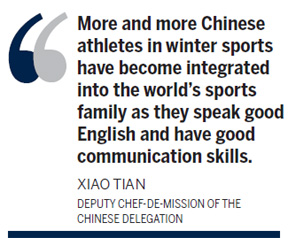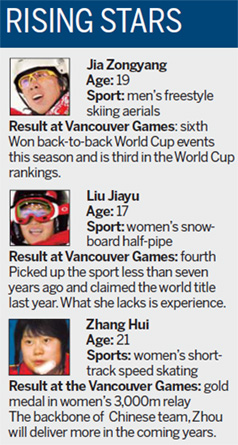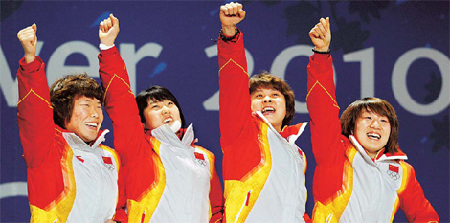Top News
Better English, more confidence and the best performance ever
By Lei Lei (China Daily)
Updated: 2010-03-01 13:55
 |
Large Medium Small |
VANCOUVER, Canada - China's stellar performance at the Vancouver Winter Olympic Games was not only marked by a record number of medals but also by the fact the nation has truly become integrated into the winter sports community.

Improved communication skills and better English have allowed Chinese winter sports athletes to open up to the world and those factors are considered the main reason for the team's remarkable achievements in Vancouver.
"More and more Chinese athletes in winter sports have become integrated into the world's sports family as they speak good English and have good communication skills. It makes them more confident in competitions," said Xiao Tian, deputy chef-de-mission of the Chinese delegation at the Vancouver Winter Games.
"It is one of the main reasons why they did such a good job in Vancouver."
At the Games, the ninth Winter Olympics for China since it made its debut at the 1980 Lake Placid Games, the Chinese delegation collected five gold medals, two silvers and four bronze, ranking the country eighth in medals won. If counted by golds, China were seventh.
"The Chinese teams fulfilled their tasks at the Vancouver Games, realizing major breakthroughs," Xiao said. "Their performances were widely applauded by the public back in China. They showed what they are capable of doing.
"Off the ice and snow, China's first Winter Olympic gold medalist, Yang Yang, was elected to the International Olympic Committee, which shows that a young generation of Chinese athletes is integrating into the world of sport. We are very much open to the world now."
Xiao also attributed the team's success to "outside" influences.
"In order to prepare for the Vancouver Games we invited some foreign coaches and also sent athletes to train and compete abroad," Xiao said. "We also implemented world-class facilities and technologies."
However, the official realizes winter sports in China still face numerous problems including not enough reserve teams and basic weaknesses in some sports including Alpine skiing and cross country.
"Actually, China is not capable enough to pose a strong threat to winter sports powerhouses such as Germany and Norway," said Xiao. "We are still at a very low level in snow events and, as for ice hockey, which is one of the most popular sports at the Winter Games, we are extremely weak. We still have a long way to go on the way to becoming a winter sports powerhouse. We will enhance our investment in the sports and work out more policies to promote them among local sports authorities."









